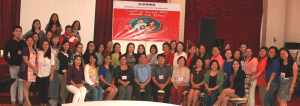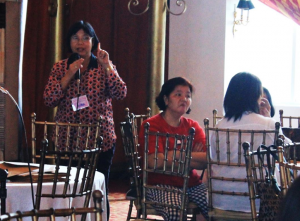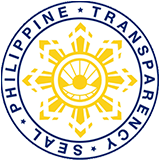 In line with adoption consciousness celebration and to raise their awareness and knowledge on the processing of alternative parental care, the Department of Social Welfare and Development – National Capital Region (DSWD-NCR) provided adoption orientation-forum to some 50 invited government health workers and medical practitioners in Metro Manila.
In line with adoption consciousness celebration and to raise their awareness and knowledge on the processing of alternative parental care, the Department of Social Welfare and Development – National Capital Region (DSWD-NCR) provided adoption orientation-forum to some 50 invited government health workers and medical practitioners in Metro Manila.
Among the topics discussed during the orientation are the regional situation on children for alternative parental care in NCR, the laws on adoption and foster care, rules and regulations in reporting child abuse and abandoned children and the government’s response in strengthening alternative parental care programs and services.
Based on the RA 8552, the State shall provide alternative protection and assistance through foster care or adoption for every child who is foundling, neglected, orphaned or abandoned.
In this, the primary consideration in processing a temporary (foster care) or permanent (adoption) parental care for said cases are the best interest for the child to be loved, nurtured and secured.
The Department initiated this activity held yesterday in Quezon City since some cases of adoption were initially processed in hospitals and lying-in clinics, even upon delivery of the child or upon admission of the abused patients, who are children.
Dra. Elizabeth Medina from East Rembo Lying – In clinic in Makati City shared how the activity opened her eyes on the proper  process of adoption including the responsibility of reporting abused, neglected and abandoned child to authorities.
process of adoption including the responsibility of reporting abused, neglected and abandoned child to authorities.
“Mejo out of place ang feeling namin kanina dahil pang social worker ang pinag uusapan at ano naman ang kinalaman namin dito. pero After a while nalaman ko na kailangan nga sigurong umattend kami nito para malaman namin ang proper procedure when we encounter abandoned children or if we during the course of interviewing mothers ay nahuhuli namin sa kasinungalingan giving us fictitious names and addresses na ang sole purpose nun ay para madamay kame sa paggawa ng simulated birth certificate… and yung experience na inaamin na hindi naman sa knila ung bata at iniwan lang sa kanila ng katulong, diko alam na dapat pala naming i-report yun so next time na may ma encounter ay irereport na namin,” she said.
RD Vincent Andrew T. Leyson expressed gratitude to the active participation of the attendees which signals that they are willing to be the advocate of the Department in disseminating and implementing the proper process of adoption and foster care.
DSWD is the issuing party of the Certificate Declaring a Child Legally Available for Adoption (CDCLAA) which is the first step of adoption after the child was proven to be neglected/ abandoned through the submission of pertinent documents, or was voluntarily committed by his/her parent(s)/ legal guardian.
According to Section 4 of RA 8552, the following may adopt a child that is legally available for adoption:
(1) Any Filipino citizen of legal age, in possession of full civil capacity and legal rights, of good moral character, has not been convicted of any crime involving moral turpitude; who is emotionally and psychologically capable of caring for children, at least sixteen (16) years older than the adoptee, and who is in a position to support and care for his/her children in keeping with the means of the family. The requirement of a 16-year difference between the age of the adopter and adoptee may be waived when the adopter is the biological parent of the adoptee or is the spouse of the adoptee’s parent;
(2) Any alien possessing the same qualifications as above-stated for Filipino nationals: Provided, That his country has diplomatic relations with the Republic of the Philippines, that he/she has been living in the Philippines for at least three (3) continuous years prior to the filing of the petition for adoption and maintains such residence until the adoption decree is entered, that he/she has been certified by his/her diplomatic or consular office or any appropriate government agency to have the legal capacity to adopt in his/her country, and that his/her government allows the adoptee to enter his/her country as his/her adopted child. Provided, further, That the requirements on residency and certification of the alien’s qualification to adopt in his/her country may be waived for the following:
(i) a former Filipino citizen who seeks to adopt a relative within the fourth (4th) degree of consanguinity or affinity;
(ii) one who seeks to adopt the legitimate child of his/her Filipino spouse;
(iii) one who is married to a Filipino citizen and seeks to adopt jointly with his/her spouse a relative within the fourth (4th) degree of consanguinity or affinity of the Filipino spouse.
(3) The guardian with respect to the ward after the termination of the guardianship and clearance of his/her financial accountabilities.
Husband and wife shall jointly adopt, except in the following cases:
(i) if one spouse seeks to adopt the legitimate child of one spouse by the other spouse; or
(ii) if one spouse seeks to adopt his/her own illegitimate child: Provided, however, That the other spouse has signified his/her consent thereto; or
(iii) if the spouses are legally separated from each other.
In case husband and wife jointly adopt or one spouse adopts the illegitimate child of the other, joint parental authority shall be exercised by the spouses.###



